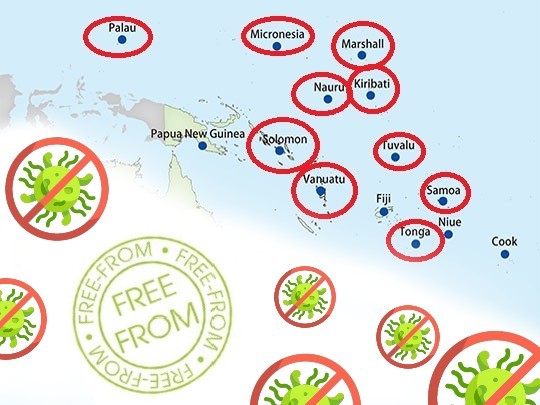Some Pacific counties have successfully kept out COVID-19. How did they do it, and how long can they remain coronavirus free?
COVID-19 was first identified in December 2019, in Wuhan, China and quickly spread across the world, resulting in a full-blown pandemic. As of today (24/08/20), over 23.5 million cases and 808,000 deaths have been reported across 188 countries/territories. Since its outbreak, news about the coronavirus has dominated our lives and it is hard to believe that there are countries that have not suffered a single COVID-19 case. However, 10 Pacific Island countries in Oceania remain free of coronavirus:
Kiribati, Marshall Islands, Micronesia, Nauru, Palau, Samoa, Solomon Islands, Tonga, Tuvalu, Vanuatu. North Korea and Turkmenistan have not declared any COVID-19 cases so far; however, many experts are concerned that their governments may be hiding the truth about infected people. Official health statistics in Turkmenistan are believed to be ‘notoriously unreliable’. In the case of North Korea, there has been speculation of coronavirus-related deaths amongst the military along the Chinese border.
How did these Pacific countries achieve what others could not? The answer is rather simple: ‘self-isolation’. Most of these countries went under lockdown as early as February and implemented strict travel bans to keep their citizens safe from the virus. It shows how swift response in the earliest stages of the pandemic is crucial in keeping the virus out. It is worth noting that these islands and their populations are very small. For example, Nauru is only 21 km2 and its population of 10,670 is the second smallest in the world after Vatican City. Nauru is also said to be the least visited country in the world. The situation is similar on neighbouring islands. These islands are coronavirus-free because of their unique characteristic of being isolated islands in the Pacific Ocean, therefore, travel bans are less of a challenge for them. But what is the cost of remaining coronavirus free?
In Vanuatu, a large number (around 80%) of the population consists of ‘subsistence farmers’, who grow their own food and therefore rely on the local economy. These people are less worried about being cut off from the rest of the world. Palau, however, highly depends on tourists. Last year, almost a million people visited the island, which is five times Palau’s population. Considering that tourism makes up around 40% of the country’s GDP, strict travel bans are killing the economy. The boarders of Palau have been closed since March, so are hotels and souvenir shops. The people of the Marshall Islands are also struggling with both tourism and the fishing industry in decline. Boats that have been in infected countries are banned from entering the Marshall Islands and the country’s export has also fallen by 50%. Similarly to other countries, the government has offered financial support for individuals and local businesses, but it will not offset the long-term economic effects of the lockdown. The Australian government has also provided financial assistance to ten countries in the region. The Pacific countries are infection-free but not free from the impact of coronavirus.

